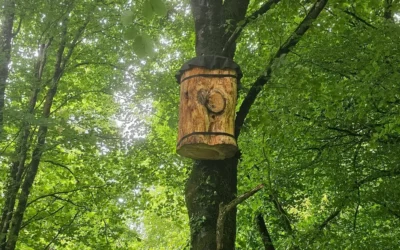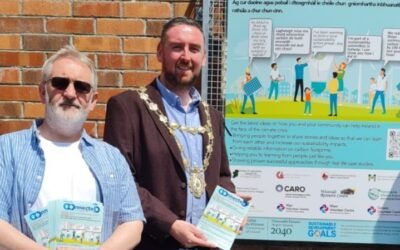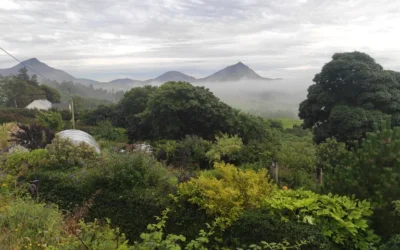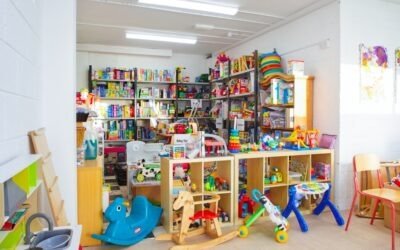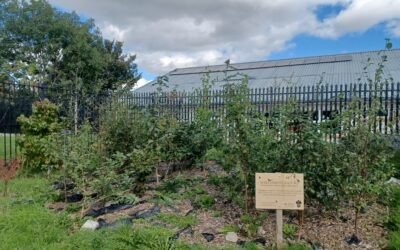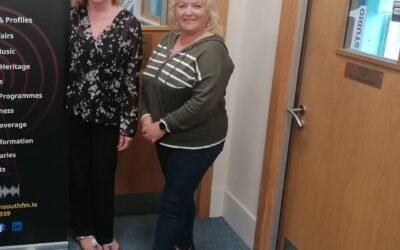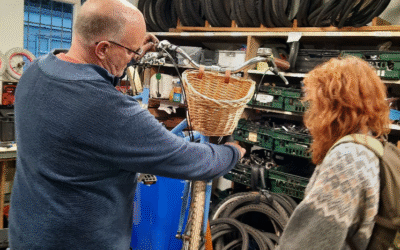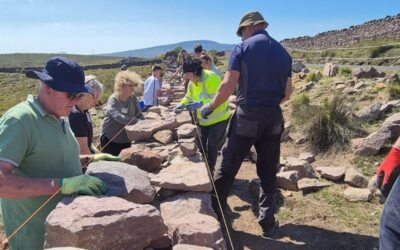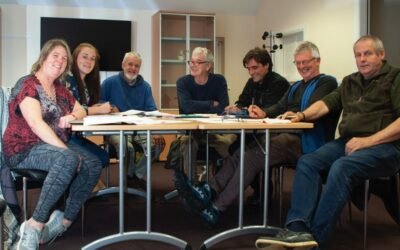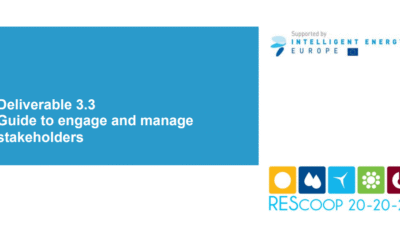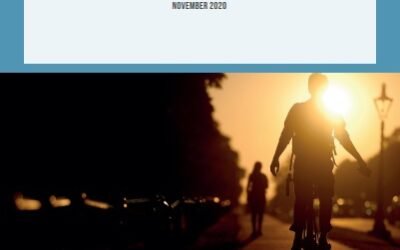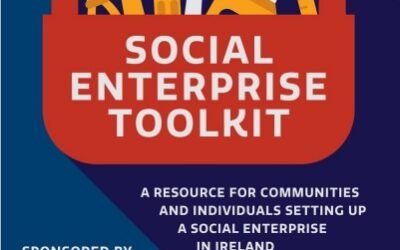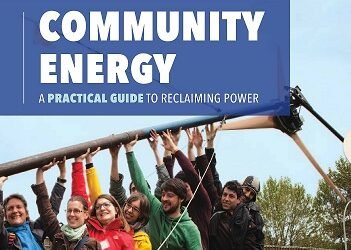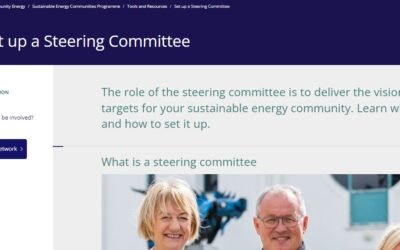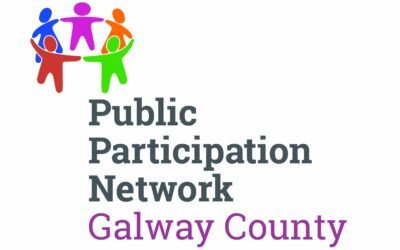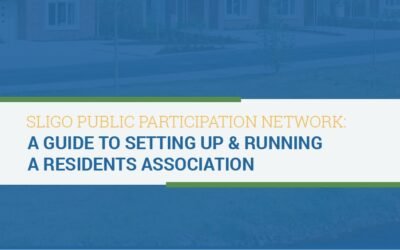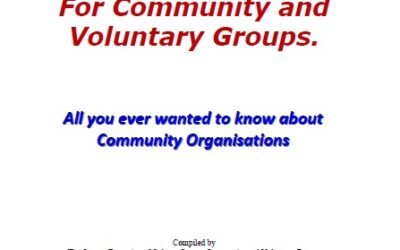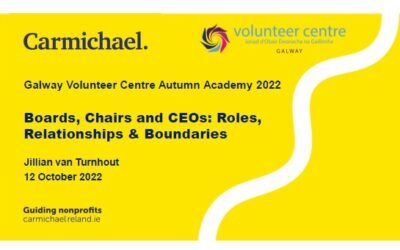Developing Your Community Organization

We work best when we work together, and sustainability actions will need to be collective rather than individual if we want them to have best effect.
This is a set of resources that gives you guidance on how to set up a voluntary or a community organization. It covers important topics like: identifying community needs, how to form a dedicated team, deciding on a suitable organizing structure.
Boomtreebees – from tiny creatures to a BIG result
Boomtreebees is a conservation and natural beekeeping project in Ireland which is all about protecting the native Irish honeybee (Apis mellifera mellifera). They make semi‑natural habitat (log hives) to serve as nesting sites, and do research and education to share what they have found out about how to help bring back the Irish honey bee in the wild. They have helped Irish bees make more than 200 wild bee hives.
West Side Resource Centre – a supportive, local ecosystem. Podcast with James Coyne
The Westside Resource Centre is a hub for the community where people can find resources and make connections to help kickstart their sustainability actions – there are resource centres and community hubs throughout Ireland: find yours and start your own action. In our latest podcast, Maeve from the Climate Connected series speaks with James Coyne, the CEO of the Galway Westside Resource Centre, about how his community-focused organisation is tackling climate and environmental issues from the ground up.
OURganic Gardens – a smallholding with big lessons
OURganic Gardens is an outdoor teaching garden in northwest Donegal. They teach people how to grow food and work with nature, not against it. It’s a place where people can come together to learn, volunteer, and enjoy the outdoors through classes and garden tours. It helps other people and groups do similar gardens in their own place.
Carrickmacross Toy Library
This is a volunteer-led, non-profit toy-lending service that is about reducing waste and over-consumption of toys by allowing people who mind and care for children to borrow toys instead of having to buy new ones. The toys are also carefully chosen to be as sustainable as possible and many are ‘pre-loved’
Pocket Forests – bringing nature into towns
Pocket Forests works on restoring biodiversity, soil health, and community connection by making small, dense plantings of native trees and shrubs in built up areas. They use the ideas from the Miyawaki or “Tiny Forest” approach. They also use permaculture to make richer and healthier soil that has become poor by being neglected. Since 2020, more than 100 pocket forests have been planted around Ireland.
Mulranny: Use what’s in your community to develop it sustainably
Maeve interviews Carol Loftus, of the Sustainable Energy Community in Mulranny, Mayo. The discussion highlights the journey of Mulranny from a fading tourist spot to a thriving model of community-driven sustainable development. Carol outlines how projects emerged, how local people were mobilised, how outside expertise and funding were drawn in, and how sustainability has been woven into tourism, energy, and heritage initiatives.
An Mheitheal Rothar – Galway’s Community Bike Workshop
An Meitheal Rothar is a not for profit Co-operative and Sustainable Business run by a team that creates positive change. It was born from the idea that people could come together in a group or a cooperative, to help each other as part of a community. An Meitheal Rothar fixes bikes, sells bikes, and teaches people how to repair bikes. It gives bikes for people in need, it asks for more walking and cycling in Galway City, helps us re-use and recycling things more – what is called the ‘circular economy’.
Stone Wall Festival — Rebuilding heritage the regenerative way
What started as a small, hands‑on community weekend became an example of regenerative tourism (where vistors make a place better while they visit it): visitors learn a traditional craft, rebuild a section of wall, and leave a visible legacy on the Great Western Greenway.
Working with Nature: The Rosmurrevagh Dunes Conservation Project
The Rosmurrevagh Dunes Project is a very strong example of community-led ecological restoration based in observation, care, and long-term commitment. Started by local farmers in 1996, the project began as an answer to bad erosion and . Over time, it became a leading example of learning together and how to protect the land from the sea using natural ways and not just building walls. Today, Rosmurrevagh is known as one of Ireland’s strongest sand dune systems. This was not just against erosion from the sea, but because the community learned to work with nature.
Aran Islands’ Energy Co-operative
A community owned energy cooperative representing the 3 Aran Islands. Lifetime membership is open to everyone who lives on the Islands for a fee of just €100. The cooperative is non-profit with all of the benefits going back into the community. The co-op shows how ordinary citizens can have big impacts on their community – but set things up right on a firm base.
REScoop Action Guide for Stakeholder Engagement
This guide provides practical advice on how to engage citizens and stakeholders in renewable energy cooperative (REScoop) projects. It covers a wide range of topics, including: How to get started with a REScoop project. How to organize and manage a REScoop. How to finance a REScoop project. How to involve citizens in the production, consumption, and governance of REScoop projects, How to promote cooperation between REScoops
Social Enterprises In Ireland: Legal Structures Guide
This guide gives the reader lots of information on the legal structures available for social enterprises in Ireland. It includes general information, advantages and disadvantages of each legal structure, and case studies of social enterprises that have adopted different types of legal structures. The document also talks about what you should think about when choosing a suitable legal structure. These include where you may expect to get money supports from and the needs of stakeholders.
Social Enterprise Toolkit
A toolkit for social enterprises, including various exercises, strategies, and advice to help organizations succeed. It covers topics such as...
Community Energy: A Practical Guide to Reclaiming Power
A full guide all about community energy. It covers everything you need to build a core team, [tooltip text="how people get on with eachother in...
Tools for helping with Committee Setup (from SEAI SEC Programme)
This is a gateway or starting point into many resources offered by the SEAI. These are aimed at helping sustainable energy communities grom. It...
Collection of Resources for Community Groups (from Galway PPN)
A very large collection of resources, and guidelines specially made for community groups. It talks about topics from national policies and legal...
A Guide to Setting Up and Running a Residents Association
While this booklet is a detailed guide about how to set up a Residents Association, and how to manage it once you've set it up, its lessons are...
Setting Up a New Community Organization
Get thorough guidance on how to set up a voluntary or community organization. This document covers important topics like how to identify your...
Best Practice For Community Groups Guide
A comprehensive guide on best practices, strategies, and guidelines for community and voluntary groups. This guide covers essential topics such...
Board Roles Relationships and Boundaries
This is a presentation, providing an overview of board roles, relationships, and boundaries within the context of Galway Volunteer Centre. It...

